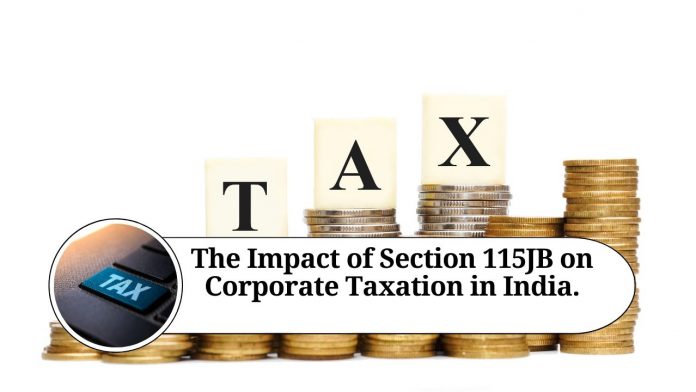Section 115JB of the Income Tax Act, of 1961, was introduced to ensure that companies, particularly those earning substantial profits, pay their fair share of taxes. The section mandates that a company must pay a minimum alternate tax (MAT) if the tax calculated under normal provisions of the Income Tax Act is lower than the tax calculated under the provisions of section 115JB.
In this blog, we will discuss the key provisions of section 115JB and their impact on companies.
Who is Covered Under Section 115JB?
Section 115JB applies to all companies registered in India, including foreign companies that have a permanent establishment in the country. However, certain entities are exempt from paying MAT, such as those engaged in infrastructure development, and power generation, and those whose income is subject to special tax provisions.
How is MAT Calculated?
MAT is calculated at the rate of 18.5% on the book profits of a company. Book profits are calculated as the net profit after tax, as shown in the profit and loss account, adjusted for certain items such as depreciation, deferred tax, and other provisions.
If the tax payable under normal provisions of the Income Tax Act is higher than the tax payable under section 115JB, the company need not pay MAT.
Example of Calculation Under Section 115JB
Let us take an example to understand the calculation of MAT under section 115JB.
Suppose a company has a net profit after tax of Rs. 10 crores as per its profit and loss account. After adjusting for depreciation and other items, the book profit is Rs. 15 crores. The tax payable under normal provisions of the Income Tax Act is Rs. 2.5 crore, whereas the tax payable under section 115JB is Rs. 2.77 crores (18.5% of book profit).
Since the tax payable under section 115JB is higher, the company will have to pay a MAT of Rs. 2.77 crore, which is higher than the tax payable under normal provisions.
Implications of Section 115JB
The introduction of section 115JB has had a significant impact on the taxation of companies in India. The provision ensures that companies earning substantial profits pay their fair share of taxes, even if they have availed various deductions and exemptions under the Income Tax Act.
Moreover, the provision has encouraged companies to maintain accurate books of accounts and financial statements. Companies need to ensure that their financial statements comply with the accounting standards prescribed by the Institute of Chartered Accountants of India (ICAI) to avoid any disputes or litigation related to the calculation of book profits.
Final Conclusion
Section 115JB of the Income Tax Act, of 1961, was introduced to ensure that companies pay their fair share of taxes. It mandates that companies must pay MAT if the tax calculated under normal provisions of the Income Tax Act is lower than the tax calculated under section 115JB. While the provision has had a significant impact on the taxation of companies, it has also encouraged them to maintain accurate financial statements and comply with accounting standards.
Read more useful content:
- section 145 of income tax act
- section 10e of income tax act
- section 9 of the income tax act
- section 94b of income tax act
- section 206aa of income tax act
Here are some frequently asked questions (FAQs) related to Section 115JB of the Income Tax Act:
What is Section 115JB of the Income Tax Act?
Section 115JB is a provision under the Income Tax Act, 1961, that mandates companies to pay a minimum alternate tax (MAT) on their book profits, if the tax calculated under normal provisions of the Income Tax Act is lower than the tax calculated under Section 115JB.
Who is liable to pay MAT under Section 115JB?
All companies registered in India, including foreign companies that have a permanent establishment in India, are liable to pay MAT under Section 115JB, except for certain entities engaged in infrastructure development, power generation, and those whose income is subject to special tax provisions.
How is the book profit calculated under Section 115JB?
Book profit is calculated as the net profit after tax, as shown in the profit and loss account, adjusted for certain items such as depreciation, deferred tax, and other provisions.
What is the rate of MAT under Section 115JB?
The rate of MAT under Section 115JB is 18.5% of the book profits of a company.
Is MAT applicable to all companies, even if they are incurring losses?
Yes, MAT applies to all companies, even if they are incurring losses, as long as they have book profits.
Can companies claim any deductions or exemptions while calculating book profits under Section 115JB?
No, companies cannot claim any deductions or exemptions while calculating book profits under Section 115JB. The provision ensures that companies pay taxes on their book profits, irrespective of any deductions or exemptions they may have claimed under the normal provisions of the Income Tax Act.
What is the impact of Section 115JB on companies?
The introduction of Section 115JB has had a significant impact on the taxation of companies in India. The provision ensures that companies earning substantial profits pay their fair share of taxes, even if they have availed various deductions and exemptions under the Income Tax Act. It has also encouraged companies to maintain accurate books of accounts and financial statements.




















